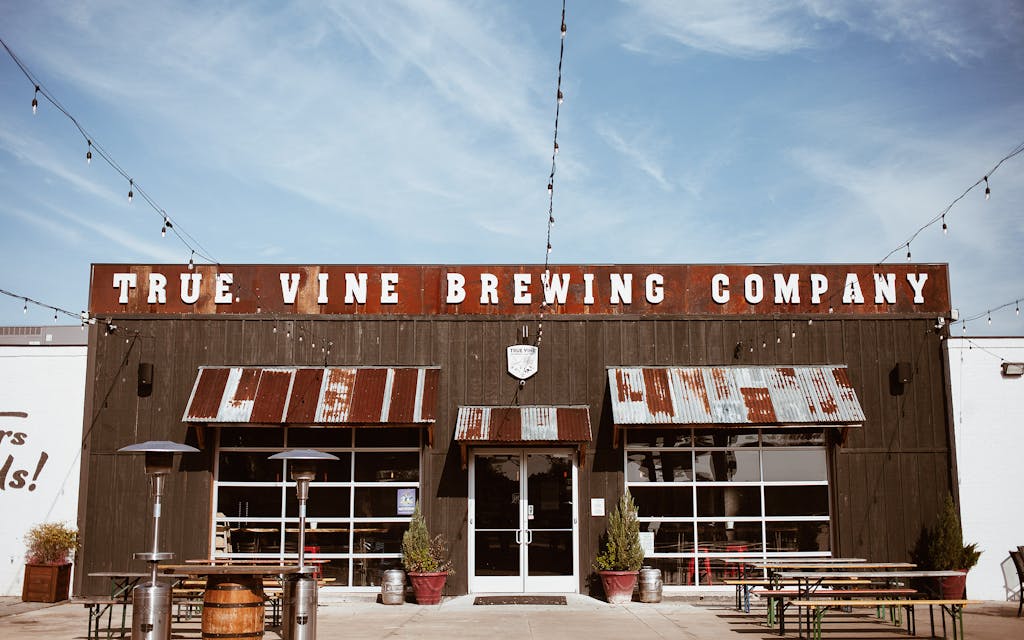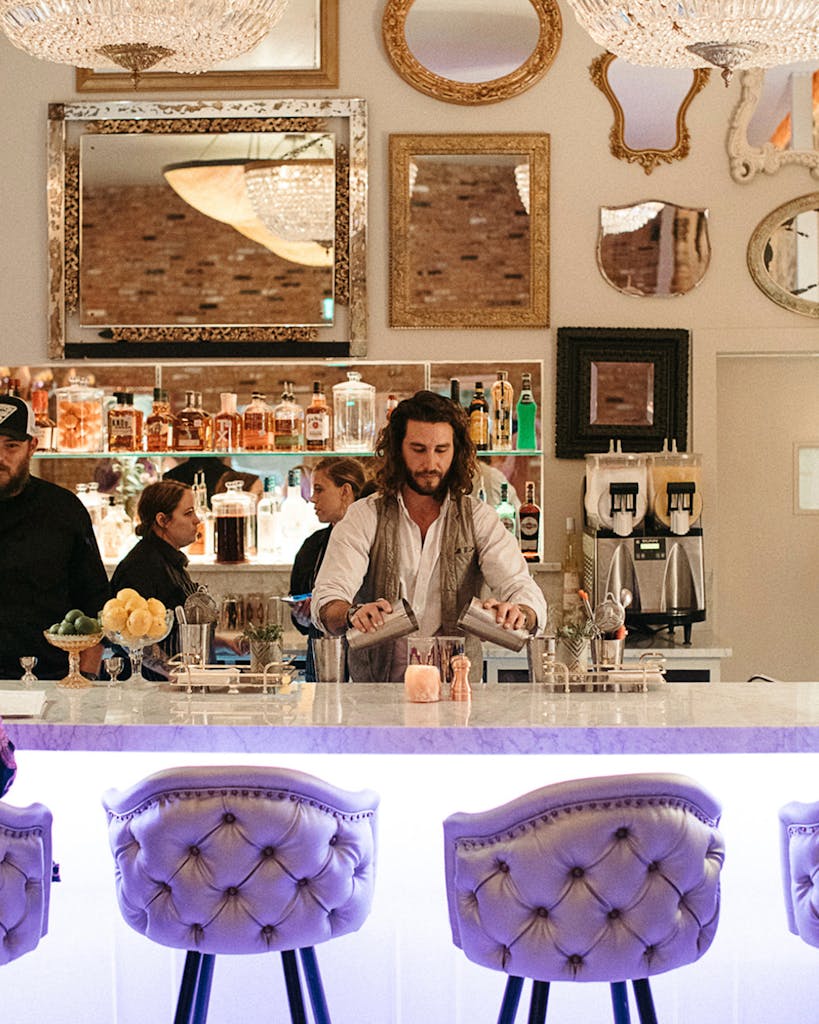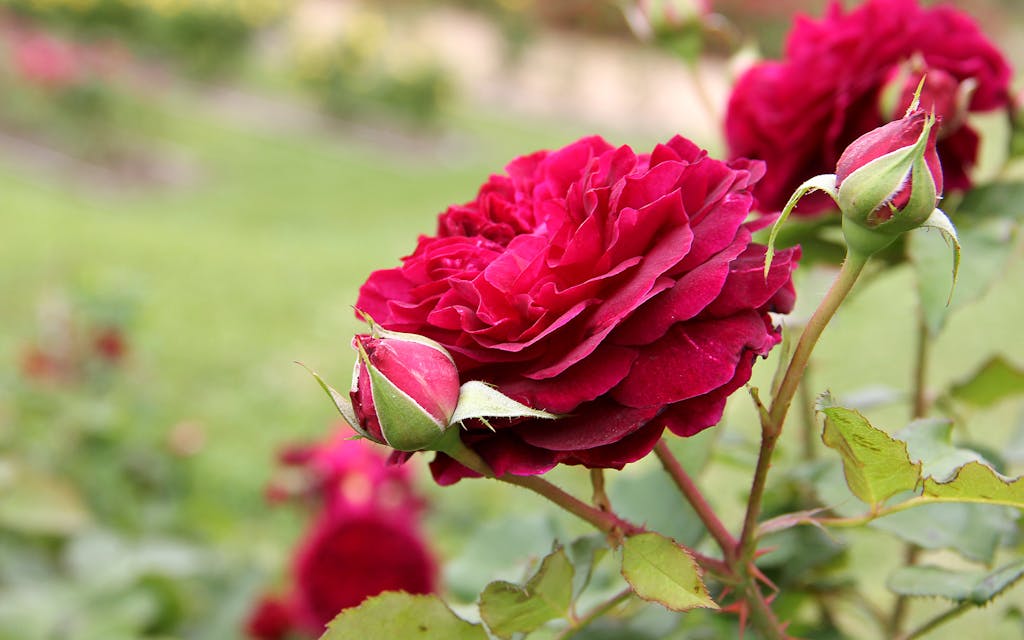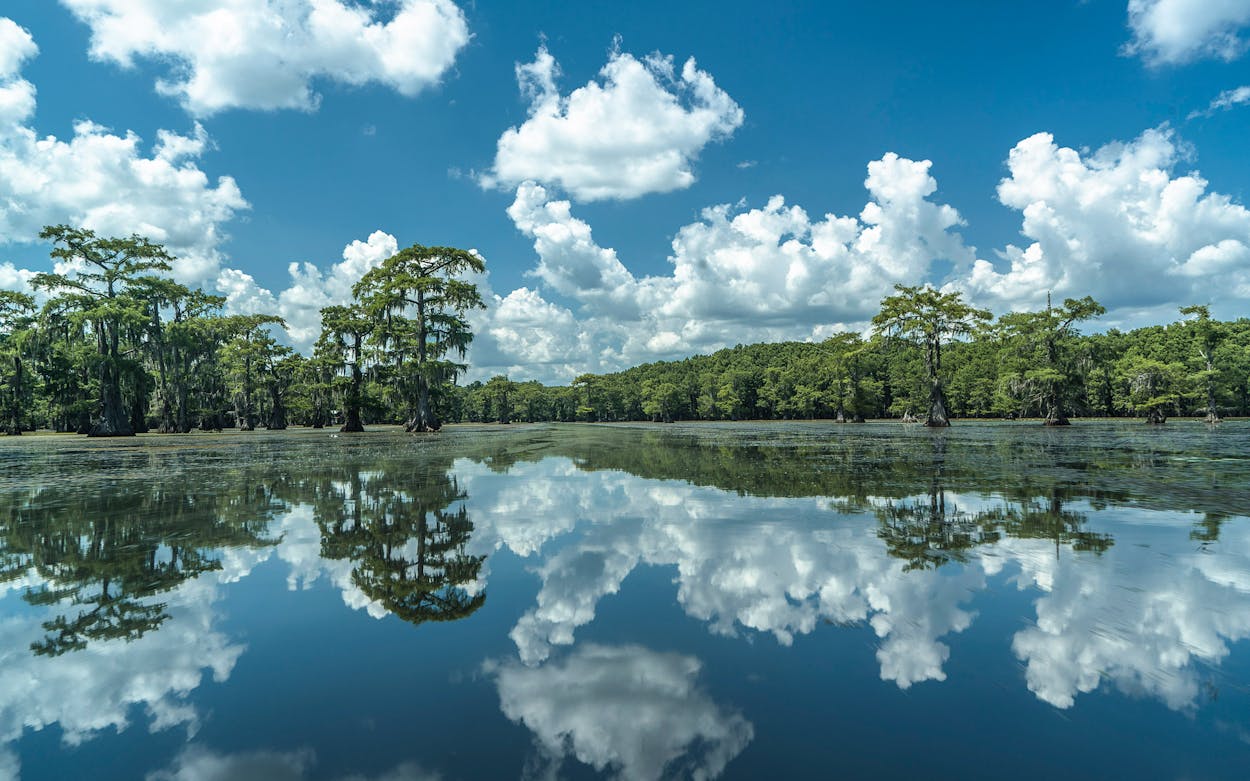I’ve never worn a beekeeping suit before, but when you road-trip through the Piney Woods, you do as the East Texans do. You hang with bees and eat honeycomb for lunch. You drive past dense forests and a town called Uncertain. You breathe in the quiet of the massive sky, the green hills, the crimson clover that dots the grass like crumbs of red velvet cake.
The suit belongs to Meagan Elzner, keeper of millions of bees (“the girls,” she calls them), who invited me to her stomping ground in Jacksonville, about thirty miles south of Tyler. It’s my first stop—the six-hundred-acre Elzner Farms, where Elzner lives with her husband and their young children. Though tourists seldom visit the property, they do buy the Elzners’ beeswax lip balm, rosemary-lavender healing beeswax salve, and, of course, honey, at boutiques, bakeries, and general stores all over East Texas.
As she tends her hives, her thick blond hair tucked under the mesh head covering, Elzner talks pollen and bee pheromones and the pervasive adulterated-honey scam. Carefully extracting a hive frame, she effuses about the artificially inseminated queen that she and her husband just ordered, a member of a breed developed in the last century by an esteemed beekeeping monk. When I ask if introducing the new queen will affect the local ecosystem, she says she sure hopes so. “We breed for honey-making, gentleness, and mite control,” she says. “We want to populate East Texas with better bees.”

Over the last few years, the Piney Woods region has undergone its own ecosystem upgrade, so to speak: While some are transplants (Meagan Elzner hails from southern Illinois, her husband from Corpus Christi), many East Texan business owners are locals who left town and then returned with cool ideas. They set up camp in Tyler, Jacksonville, or Palestine, and have introduced better, or at least more bougie, businesses than their hometowns have ever seen—a cafe that doubles as an art gallery or a craft brewery with an award-winning sour beer or a boutique reminiscent of Rose Apothecary from Schitt’s Creek. Among residents I meet, I’m surprised to hear consensus about the swankifying of East Texas: growth, they say, is good.
Maybe that’s because it boosts the economy. According to James Hubbard, president of the Jacksonville Economic Development Corporation, in 2020 Jacksonville saw the most residential home permits ever issued in a single year. “Progress means jobs,” says Becky Hesterley, of HomeLand Real Estate in Jacksonville. “It means people come in. It means they stay and invest in our communities.” To that end, the Downtown Redevelopment Program, a sort of untelevised small-town Shark Tank, offers up to $50,000 to qualified entrepreneurs who want to start a business in one of downtown Jacksonville’s vacant buildings. The program has so far awarded seven grants, including to Neighborhood Coffee, a husband-wife cafe that’s set to open in October (Jessey Woodson, one half of the couple, grew up in Jacksonville).
The changes in the region feel subtle. Developers aren’t demolishing historical architecture to erect a Sheraton (in Nacogdoches, there’s a fiercely preserved fort that was … never even used as a fort); Elon Musk isn’t blowing up rockets in the neighborhoods. East Texas has gotten a little well-placed Botox, but not a full face-lift. “What’s happened to Austin would never happen in Jacksonville,” Hesterley says, referring to the capital’s exponential growth and prohibitive housing prices. “Our population is fourteen thousand or fifteen thousand. It wouldn’t even happen in Tyler.” Exploring the Piney Woods is like hunting for hidden treasures: you’ll go miles seeing only cattle and blueberry farms, perhaps an errant Confederate flag (there are some ugly threads woven into the region’s picturesque tapestry—see anti-masking, rampant). Then, suddenly, among the goats and fields, you’ll stumble onto luxury. In Jacksonville, for instance, an ayurvedic healing practitioner will pour warm oil on your third-eye chakra to rebalance your body’s energies.

More than a year into a global pandemic, I can only describe my energy rebalancing session, known as shirodhara, as sesame oil–scented rapture. It commences at Hotel Ritual and Wellness Center, the bed-and-breakfast that serves as my home base for exploring Jacksonville and nearby Palestine and Tyler. Ritual’s owner, Whitney Graham, grew up in Jacksonville, then lived in Paris and Austin. Seventeen years after leaving, she returned home to raise her daughter and build a little empire, starting with an artisanal snow cone truck. (“Pregnancy craving,” she says by way of explanation.) She followed Super SNO with Ritual Luncheonette, a cafe that sells quiche and avocado toast and homemade desserts, then the yoga studio upstairs, then the wellness center and four rooms that make up the small hotel. This May, with the help of the Downtown Redevelopment Program, she opened Bar Ritual, a moody Wes Anderson–esque cocktail bar with a deer head on the wall, chandeliers and candelabras, and leopard-print chairs. Ritual is a one-stop getaway, offering everything from a labyrinth for walking meditation to a heated pool to a grilled cheese sandwich with Muenster and sweet pickles on the side. “There was a need here,” Graham tells me as she muses about turning her hometown into a retreat, “not just for locals but for all people, to escape the modern metropolis and return to the self and reboot.”
Conveniently, Ritual is just a half hour from Palestine (whose last syllable is pronounced “steen”), where I drive the next day for a slice of pie. Palestine is one of those small Texas towns that look like a still from a western; you think that at any minute someone’s going to dismantle the set. Known for the Texas State Railroad and its 1,800 historical sites, including cemeteries, churches, and impressive nineteenth-century mansions, Palestine is the place to go antiquing and pie eating. My destination is Oxbow Bakery, with its vintage Coca-Cola signs, chalkboard menu, and country cheer. The family that owns it has another prodigal son story: David Wolfe grew up in Palestine, left for college in 2000, and stayed gone for years, returning only when his mother—who was running Oxbow as an antique shop—started serving pie and couldn’t keep up with the sudden demand. Wolfe met and married a Jacksonville girl, Breezy Lake, and now the whole family works together at Oxbow, slinging one hundred pies a day.
While I’m eating/having a religious experience with a slice of coconut meringue and chatting with Breezy (whose last name is now Lake-Wolfe), a woman says hello to her, then looks at me, and says, “Oh, hi, I met you last night!” She doesn’t seem surprised, and I guess I’m not either. This region feels like a village: You meet someone once and run into her the next morning; Oxbow sells the Elzners’ honey; Lake-Wolfe and Graham “grew up in the same country church and did Easter egg hunts together.”
From Palestine, I drive north on Texas Highway 155 to Tyler, the “Rose Capital of the World,” a designation that sounds on-brand in the proud Piney Woods. Jacksonville is home to “the world’s largest bowl of salsa.” Nearby Athens makes the highly contested claim that locals invented hamburgers. (Its water tower reads “HAMBURGERS.”) Every October for 88 years, Tyler has held a three-day Texas Rose Festival, and every year a “queen,” one lucky young woman with deep Tyler roots, wears a hand-made gown that tells a story about that year’s festival theme and herself. If I could be reincarnated, I wouldn’t mind returning as the Tyler Rose Queen. The first gown included real sapphires, and over the years the designs have only grown more elaborate. In 1995, the queen’s one-hundred-pound gown had a seventeen-foot train.
With its 32,000 bushes, the Tyler Rose Garden is the largest rose garden in the country. I wander through it, down paths and under stone arches and past statues and fountains and a TYLER sign built of human-sized letters but missing its Y. I take the bait and pose for the picture. The rose theme (though not the actual roses) perfumes the whole city: At True Vine Brewing Company—whose owner also grew up in East Texas, left, and returned—one of the best beers is the Rose City IPA. Saturday night, I nibble from a cheese board and sip wine at The Grove, a popular and charming farm-to-table eatery that feels less like a restaurant than like a party at your wealthy friend’s summer mansion. (The owner is oil-and-gas scion Michael Herd, husband of Bumble founder Whitney Wolfe Herd. And fact: at rose festivals in the eighties, Herd’s mother and aunt served in the queen’s court.) A sign hanging over a couch in the bar and lounge reads, “The more champagne I drink, the more you look like the Rose Queen.” Upstairs from the rose garden, Rose Queen gowns hang preserved and displayed on mannequins in a little museum. When I glance up from the bushes, a bride appears on the terrace, her wedding party dressed in blue.

My last day in the Piney Woods, I grab one last soak in Ritual’s jacuzzi, and then drive east on U.S. 79 to Caddo Lake. The area is named for the Caddo peoples who inhabited this land before the Spanish showed up in the 1500s, before the lumber “bonanza” began in the 1880s and decimated most of the piney-ness. Caddo is absolutely in the middle of nowhere and very much worth visiting. Tourists can camp inside the state park and rent canoes and kayaks to cruise among the bald cypress trees, where Spanish moss hangs into the water like Dr. Seuss art.
Spanish moss is not from Spain. Native to East Texas, it favors a warm climate, clean air, and slow-growing trees that have been around forever. That said, it’s not parasitic: It doesn’t deplete its old trees, it just makes them a little more beautiful.
- More About:
- Where to Stay Now
- Tyler
- Palestine
- East Texas






